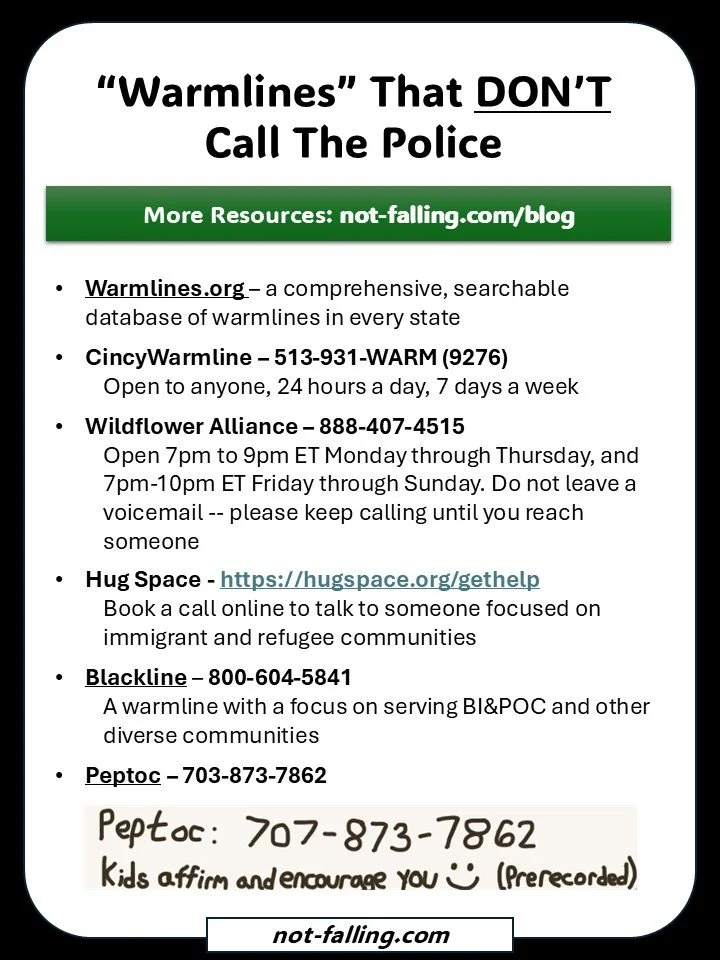Warmlines: A Way to Seek Help WITHOUT Getting Reported to the Police
By Homura
In this blog, we talk a lot about the values of companionship and accountability when going through difficult times —- (“What Does Therapy Even Do?” and Does Asking for Help Actually Build Independence?). We offer some options here if you ever need to talk to someone 24/7.
But a lot of times, there’s a valid concern —
“What if calling a hotline or crisis line triggers a law enforcement response — cops show up at the door, you get SWATted, etc?”
It’s a scary thought — and it makes a lot of people uncomfortable calling these phone numbers, even though they were designed to provide help.
That’s why we’re so excited about the concept of
WARMLINES
Warmlines, sometimes called peer support lines, are phone numbers you can call or text to get active support in real-time. It’s a play on words — unlike hotlines, the people who staff warmlines are trained to avoid calling the police.
For a partial list of the warmlines I have found helpful, scroll to the bottom of this post.
Here are some things to keep in mind before using a warmline:
-Like hotlines, warmlines connect you with a real person who will provide peer support. They will ask you what’s going on, listen to what you have to say, and help you feel calm. Typically, they will work collaboratively with you to develop a safety plan you can use, identify what social supports you have (family, friends, clinicians...), and discuss ways to cope now and in the future.
-When calling warmlines, you can have more peace of mind that a “wellness check” by police officers will not be called on you.
-If you are not in a crisis situation (i.e., you are not making a plan to kill yourself in that moment, or anytime soon), then you might consider calling a warmline over a hotline. If you feel that you are losing control and might kill yourself, you should call or text a hotline instead, such as 988 or D2L:
-Hotlines and warmlines can be full sometimes, if all operators are helping other callers (see squaklake’s comment, the operators I know have had similar experiences). If you call a warmline and get put on hold, don’t be discouraged——see if there’s another one you can call.
Finally, here’s a Reddit thread where several people shared their experiences with hotlines. It’s only a small sample of people, so this isn’t everyone’s experience, but it helped me understand.
———————————————————————————————————————————————————————————————————————————
***
The police aspect of hotlines can be intimidating. Many people, especially those from marginalized groups, have had bad experiences with police. Even though police are supposed to be trained in crisis response, and there are even designated teams for that in some areas, first responders can sometimes take people to hospitals or other inpatient facilities when they don’t want to be.
For these reasons, some individuals are more comfortable contacting warmlines, especially when they have the option of talking to someone of a similar racial background, sexual or gender orientation, belief system, or history (e.g. with substance use or military service).
Here are the warmline resources I found useful:
1) WARMLINE.ORG
A search function by U.S. state for warmlines. The “View Open, Nationwide Warmlines (English)” and “View Full Directory” tabs are broken, but NAMI has a PDF of the full list here.
A list of local crisis resources, sorted by city, which only get police involved in drastic circumstances.
3) THRIVE LIFELINE RESOURCE LIST
A helpful list of “non-carceral” (AKA, non criminal justice) resources compiled by THRIVE.
3) EXIT USA
A peer support line staffed by individuals with experience working with other individuals with violent extremist beliefs. They can also connect you with peers who were formally part of hate groups and know what it’s like. (Note: I don’t know their hours of operation. I also think calls might redirect to national hotlines if there is no one free to take the call, but I’m not certain.)
4) BLACKLINE
A warmline with a focus on serving Black, Indigenous, and people of color
A warmline for individuals recovering from mental health issues, staffed by peer supporters who have gone through similar emotions, thoughts and experiences.
6) HUG SPACE
A warmline focused on immigrant and refugee communities.
A peer support line answered by a trained peer supporter who has their own first-hand experience with psychiatric diagnosis, trauma, addiction, and/or other interrupting challenges.
8) PEPTOC
Elementary school kids say sweet and encouraging things to you in prerecorded messages.
***
Also, here is a graphic you can save to your phone or desktop:
I hope that this post helps you feel more assured of what to expect when calling a warmline or hotline. Feel free to call one or multiple of the warmlines if you want to talk to someone!


